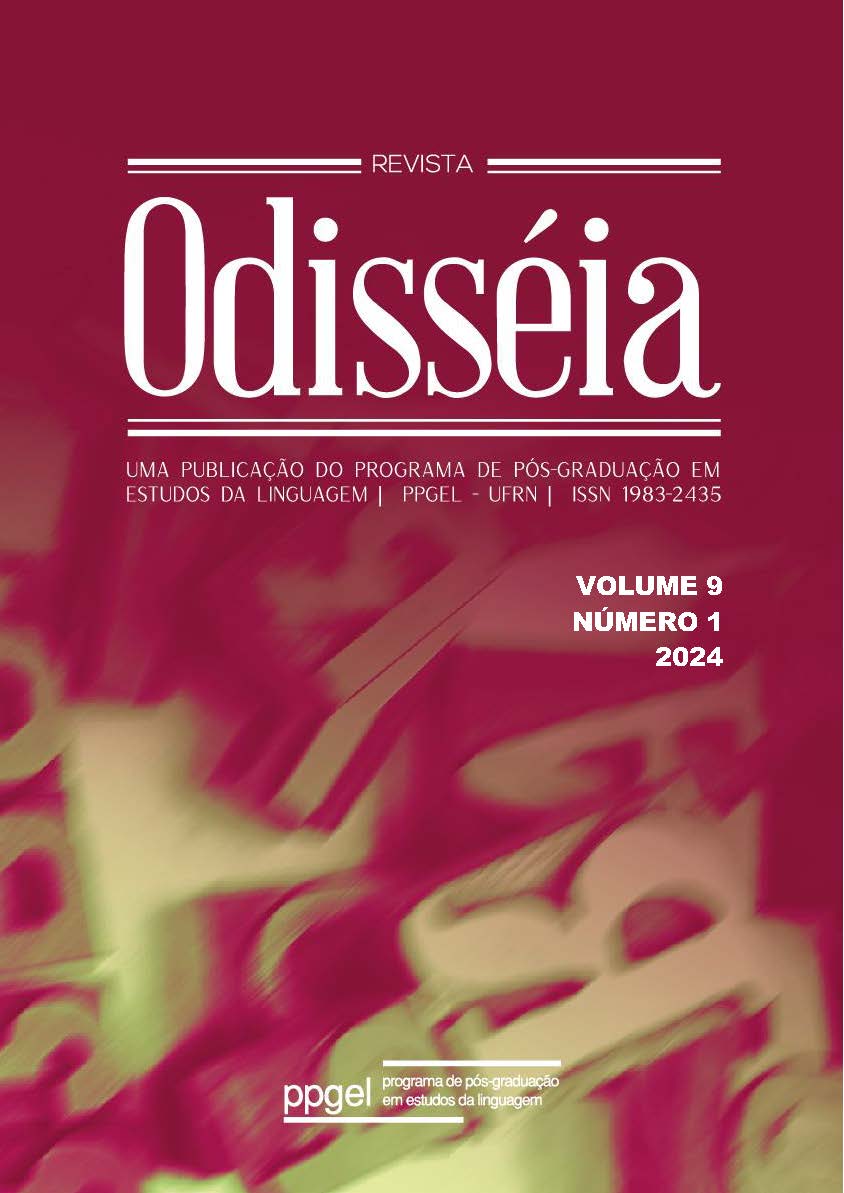The pleadings of Hercules in the prologue of the senecan tragedy Hercules Oetaeus: an appeal for immortality
DOI:
https://doi.org/10.21680/1983-2435.2024v9n1ID31745Keywords:
Latin tragedy, Hercules Oetaeus, Seneca, HerculesAbstract
Hercules Oetaeus (Hercules on Oeta) is one of the tragedies written by Seneca, which main subject is the death and the apotheosis of the great hero Hercules. The prologue of the senecan tragedy is composed by 103 stanzas through which Hercules, speakingin first person, tries to persuade Zeus, his father and the father of all gods, to provide him the power of immortality. Our article aims to present the pleadings of the hero on the prologue of the tragedy Hercules Oetaeus, along with the translation and comments about the stanzas in which the hero lists the glorious achievements conducted by himself. We understand that the role of Hercules serves as na example through which the principles of the stoic-senecan teachings can be demonstrated and, especially, disseminated. As a main text, we will use the edition signed by Fitch (2004); and, to assist us with the simbolism of the myths, we will use the researches done by Brandão (2010; 2012); and the philosophical books written by Seneca will be used as a guideline to our observations.
Downloads
References
ARCELLASCHI, André. Le théâtre de Sénèque. In: Vita Latina, N°139, 1995.
AUVRAY, Clara-Emmanuelle. Folie et douleur dans Hercule Furieux et Hercule sur l’Oeta: recherches sur l’expression esthétique de l’ascèse stoïcienne chez Sénèque. Frankfurt am Main; Bern; New York; Paris: Lang, 1989.
AVERNA, Daniela. Commento al testo. IN: SENECA. Hercules Oetaeus.Testo critico, traduzione e comento cura di Daniela Averna. Roma: Carocci, 2002.
BRANDÃO, J. S. Teatro Grego: Tragédia e Comédia. 9. ed. Petrópolis: Editora Vozes, 2002.
BRANDÃO, J. S. Mitologia Grega. Vol. III. 16. ed. Petrópolis, RJ: Vozes, 2010.
BRANDÃO, J. S. Mitologia Grega. Vol. I. 24. ed. Petrópolis, RJ: Vozes, 2012.
CARDOSO, Zélia de A. Estudos sobre as tragédias de Sêneca. São Paulo: Alameda, 2005.
CARDOSO, Zélia de A. A literatura latina. 2. ed. São Paulo: Martins Fontes, 2003.
CHAUMARTIN, F.G. Notice. IN: SÉNÈQUE. Tragédies. Tome III. Texte établi et traduit par François-Régis Chaumartin. Paris: Les Belles Lettres, 2008.
DIÔGENES LAÊRTIOS. Vidas e doutrinas dos filósofos ilustres.Tradução, introdução e notas de Mário da Gama Kury. 2. ed., reimpressão. Brasília: Editora Universidade de Brasília, 2008.
DUPONT, F. Les monstres de Sénèque: pour une dramaturgie de la tragédie romaine. Paris: Belin, 1995.
ELIADE, M. Mito e realidade. Tradução Pola Civelli. São Paulo: Perspectiva, 2006.
ERNOUT, Alfred; MEILLET, Alfred. Dictionnaire Étymologique de la Langue Latine: Histoire des mots. Retirage de la 4e. édition, nouveau format. Paris: Klincksick, 2001.
FITCH, J. Introduction. IN: SENECA. Oedipus, Agamemnon, Thyestes, Hercules on Oeta. Tragedies II.Edited and translated by John G. Fitch. Cambridge, MA: Harvard University, 2004.
FRIEDRICH, Wolf H. Sprache und Still des Hercules Oetaeus. IN: LEFÈVRE, Eckard. (hrsg.). Senecas Tragödien. Darmstadt: Wissenschafltiche Buchgesellschaft, 1972.
FUHRMANN, Manfred. Geschichte der römischen Literatur. Stuttgart: Reclam, 2011.
GAFFIOT, F. Le Grand Gaffiot: Dictionnaire Latin Français. 30éme éd. Paris: Hachette, 2000.
GONÇALVES, Carla Susana V. Invectiva na tragédia de Sêneca. Lisboa: edições Colibri, 2003.
GRIMAL, P. Sénèque ou la conscience de l’Empire. Paris: Les Belles Lettres, 1991.
HESÍODO. Teogonia. Estudo e tradução Jaa Torrano. 2. ed. 5. reimp. São Paulo: Iluminuras, 2012.
HORÁCIO. Arte Poética. Ed. bilíngue. Tradução R. M. Rosado Fernandes. Lisboa: Editorial Inquérito, 1984.
OLIVEIRA, L. de. Sêneca, uma vida dedicada à filosofia. São Paulo: Paulus, 2010.
OLIVEIRA, L. de.A constituição poético-filosófica do si-mesmo: o estoicismo nas tragédias de Sêneca. Hypnos, São Paulo, v. 36, 2016.
PARATORE, E. História da Literatura Latina. Tradução Manuel Losa. Lisboa: Fundação Calouste Gulbenkian, 1983.
PARATORE, E. Der ‘Hercules Oetaeus’ stammt von Seneca und ist früher als der ‘Furens’. IN: IN: LEFÈVRE, Eckard. (hrsg.). Senecas Tragödien. Darmstadt: Wissenschafltiche Buchgesellschaft, 1972.
RIBBECK, Otto. Senecas Tragödien. IN: LEFÈVRE, Eckard. (hrsg.). Senecas Tragödien. Darmstadt: Wissenschafltiche Buchgesellschaft, 1972.
SÊNECA. Cartas a Lucílio. Tradução J. A. Segurado e Campos. 5. ed. Lisboa: Fundação Calouste Gulbenkian, 2014.
SÊNECA.Sobre a Brevidade da vida. Sobre a Firmeza do sábio: diálogos. Tradução José Eduardo S. Lohner. 1. ed. São Paulo: Penguin Classics Companhia das Letras, 2017.
SÉNÈQUE. Tragédies. Texte établi par François-Régis Chaumartin. Emendé, presenté et traduit par Olivier Sers. Paris: Les Belles Lettres, 2011.
SÉNÈQUE. Tragédies. Tome III. Texte établi et traduit par François-Régis Chaumartin. Paris: Les Belles Lettres, 2008.
SENECA.Oedipus, Agamemnon, Thyestes, Hercules on Oeta. Tragedies II. Edited and translated by John G. Fitch. Cambridge, MA: Harvard University, 2004.
STOESSL, Franz. Der Tod des Herakles. Zürich: Rhein-Verlag, 1945.
VERNANT, Jean-Pierre. Mito e religião na Grécia Antiga. Tradução Joana Angélica D’Avila Melo. São Paulo: Martins Fontes, 2006.
VEYNE, Paul. Sêneca e o Estoicismo. Tradução André Telles. São Paulo: Três Estrelas, 2015.
WALDE, Christine. Herculeus labor: Studien zum pseudosenecanischen Hercules Oetaeus. Frankfurt am Main; Bern; New York; Paris: Peter Lang, 1992.
Downloads
Published
How to Cite
Issue
Section
License
Copyright (c) 2024 Odisseia

This work is licensed under a Creative Commons Attribution-NonCommercial-ShareAlike 4.0 International License.
Thisa work has been licensed under Creative Commons - Atribuição - NãoComercial - CompartilhaIgual 3.0 Não Adaptada.


















